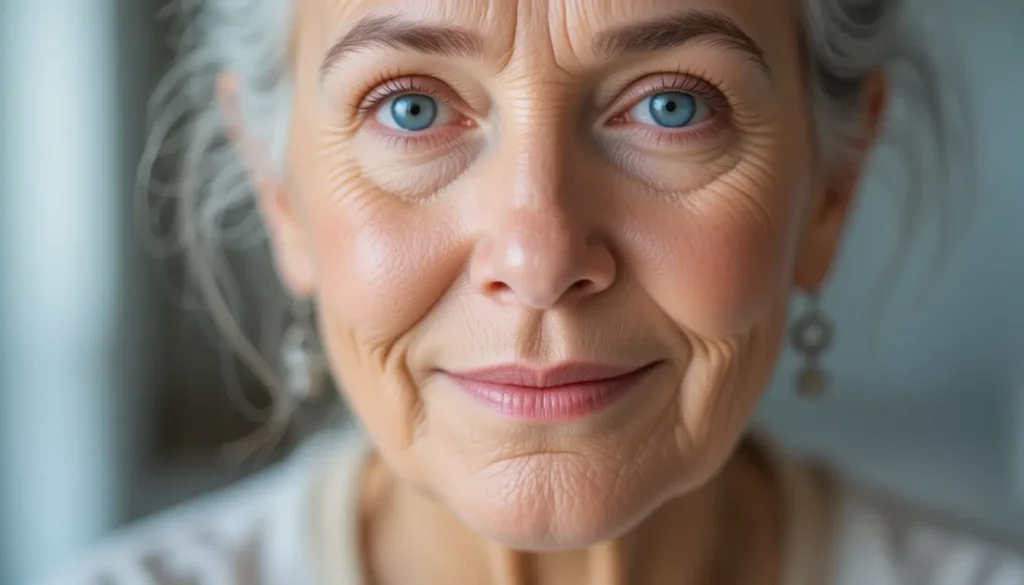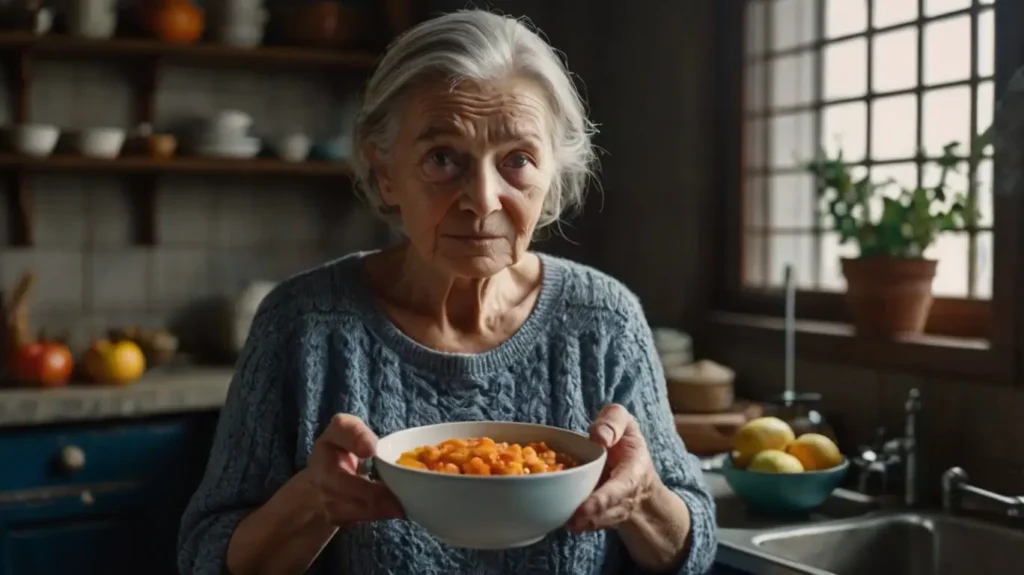Your skin changes as you grow older. It becomes thinner, drier, and more fragile. Wrinkles and dark spots appear. Some people also notice their skin heals slower.
This does not mean you have no control. What you eat plays a big role in how your skin looks and feels. Certain foods support hydration, protect from damage, and slow down visible aging. The good news is that these foods are simple, accessible, and safe for seniors. Keep reading, because each section will show you a specific group of foods and how they protect your skin from the inside out.
Hydration Foods That Keep Skin Supple
Water is essential for healthy skin, but what you eat also plays a major role in keeping your skin hydrated. Many seniors drink less water because the natural sense of thirst decreases with age.
This makes it harder for the body to stay fully hydrated, which can lead to dry, flaky, and dull skin. Eating foods high in water content helps maintain hydration from the inside out, supporting smooth and supple skin.
Cucumbers are a simple but powerful choice. They are over 90% water and contain minerals such as potassium and magnesium that help maintain the skin’s moisture balance. Adding cucumber slices to salads or enjoying them as a snack keeps the skin hydrated while providing essential nutrients.
Watermelon is another top hydrating food. Its high water content, combined with antioxidants like lycopene, helps protect skin cells from damage while keeping them moist. A few slices of watermelon during the day can make your skin feel fresher and more elastic.
Oranges and other citrus fruits do more than hydrate. They supply vitamin C, which supports collagen production and helps skin remain firm. Seniors with thinner or sagging skin benefit greatly from regular intake of vitamin C-rich fruits, as it enhances skin structure while providing hydration.
Celery is not only hydrating but also helps the body maintain fluid balance. It contains natural electrolytes that support proper hydration at the cellular level. Eating celery raw or adding it to soups and smoothies ensures consistent fluid support for the skin.
Other water-rich vegetables include lettuce, zucchini, and bell peppers, while fruits such as cantaloupe, grapes, and strawberries also contribute to daily hydration. Including a variety of these foods ensures your skin receives enough moisture and essential nutrients throughout the day.
You may believe that applying creams or lotions alone keeps skin hydrated. While topical moisturizers help, they only work on the surface. True hydration starts inside. Eating water-rich foods daily improves your skin’s moisture from within and enhances the effectiveness of any moisturizer you apply externally.
Antioxidant Foods That Protect From Damage
Skin cells face constant challenges from the environment. Sun exposure, pollution, and even everyday stress produce free radicals—unstable molecules that damage skin cells. Over time, this damage shows as dark spots, fine lines, wrinkles, and a dull skin tone.
Antioxidants fight these free radicals and help repair the damage, keeping skin healthier and more resilient. Seniors need more antioxidants because natural defense mechanisms weaken with age, making the skin more vulnerable.
Berries are among the most powerful antioxidant sources. Blueberries, strawberries, and blackberries contain flavonoids and vitamin C, which protect collagen—the protein that keeps skin firm. Eating a small bowl of mixed berries daily helps reduce oxidative stress on skin cells and supports skin repair.
Tomatoes are rich in lycopene, a strong antioxidant that shields the skin from sun damage. Regular consumption of cooked or raw tomatoes can improve the skin’s natural defense against UV-related harm. Lycopene also helps maintain elasticity, making the skin look smoother over time.
Green leafy vegetables such as spinach, kale, and Swiss chard provide a combination of vitamins A, C, and E. These nutrients promote skin healing, maintain moisture, and improve tone.
Vitamin A supports cell turnover, vitamin C strengthens collagen, and vitamin E protects against oxidative stress. Seniors who include leafy greens in daily meals often notice healthier, more radiant skin.
Other antioxidant-rich foods include bell peppers, broccoli, nuts, and seeds. These foods not only protect against damage but also help repair existing stress in the skin. Consistently eating a variety of antioxidants ensures long-term skin resilience.
Healthy Fats That Keep Skin Smooth
Fat is not the enemy when it comes to healthy skin. In fact, skin needs fat for structure, softness, and protection. Without enough healthy fats, skin can become dry, rough, and inflamed. Seniors should focus on fats that lower inflammation, strengthen the skin barrier, and support overall skin health.
Avocados are a top choice. They are rich in vitamin E and monounsaturated fats, which keep the skin soft and supple. Vitamin E also protects skin cells from oxidative damage and helps maintain moisture. Adding half an avocado to breakfast or a salad daily provides essential fat that nourishes the skin from within.
Olive oil is another excellent option. Extra virgin olive oil contains healthy fats and antioxidants that reduce inflammation. Drizzling olive oil on vegetables, salads, or cooked dishes not only adds flavor but also protects skin against dryness and irritation. It supports the skin barrier, helping it retain moisture throughout the day.
Fatty fish, including salmon, mackerel, and sardines, are rich in omega-3 fatty acids. Omega-3 reduces inflammation in the skin, improves elasticity, and helps prevent redness or irritation. Seniors who include fatty fish in their diet regularly often notice smoother skin and less sensitivity to environmental stressors.
Nuts and seeds such as walnuts, almonds, and flaxseeds provide healthy fats, vitamin E, and minerals. A small handful each day supports skin health, protects against free radical damage, and keeps the skin flexible. They are easy to add to meals or snacks and deliver consistent skin benefits.
Vitamins and Minerals That Boost Skin Health
Healthy skin needs more than hydration and fats. Vitamins and minerals are essential for keeping skin strong, smooth, and resilient. Deficiencies in these nutrients can lead to weak, dull skin that is more prone to damage, dryness, and slow healing. For seniors, getting enough of these nutrients is especially important because absorption decreases with age.
Vitamin C is a top priority. Found in citrus fruits, kiwi, and bell peppers, vitamin C is essential for collagen production. Collagen provides structure and firmness, helping reduce wrinkles and sagging. Seniors who include vitamin C-rich foods daily support their skin’s strength and overall texture.
Vitamin A plays a critical role in skin repair and cell turnover. Sources include carrots, sweet potatoes, and leafy greens. Adequate vitamin A reduces dryness and supports the healing of minor cuts and bruises, which seniors may experience more often.
Zinc is another key nutrient. Found in pumpkin seeds, lentils, and beans, zinc helps wounds heal faster and supports immune function in the skin. Seniors who bruise easily or have slower recovery times benefit from including zinc-rich foods regularly.
Selenium protects skin cells from oxidative stress. Brazil nuts, whole grains, and eggs provide selenium. It helps prevent cell damage that can lead to premature aging and dullness, keeping skin healthier for longer.
Protein is essential for maintaining skin structure. Eggs, beans, lean meat, and tofu supply the amino acids your body needs to build and repair skin tissue. Without enough protein, skin becomes thinner, less elastic, and slower to recover from injuries.
Building a Skin-Friendly Daily Diet
Now that you know the key foods, the question is how to use them daily. Many seniors find diet changes difficult. But small, steady changes bring the best results.
Start with breakfast. Add berries to oatmeal or yogurt. Use a boiled egg for protein. Drink a glass of water with cucumber slices for hydration.
For lunch, include leafy greens with olive oil. Add grilled fish or beans for protein and omega-3. A side of tomatoes helps fight skin damage.
Dinner can feature steamed vegetables such as carrots and spinach. Add chicken, lentils, or tofu for protein. A handful of walnuts or almonds makes a good snack.
Snacks should also support skin health. Try orange slices, watermelon cubes, or celery sticks. Replace processed snacks with these natural options.
Pattern break: you may think it takes months to see changes. But within weeks of eating skin-supporting foods, many seniors notice smoother, brighter, and healthier skin.
Your skin reflects what you eat. Seniors can slow skin aging by making smart food choices every day. Hydration, antioxidants, healthy fats, vitamins, and minerals all play their part.
This is not about restriction. It is about including the right foods that strengthen your skin from within. Small changes in meals bring visible differences in skin tone, texture, and strength.
The payoff is not just better skin. It is also better health overall. By feeding your skin daily with the right foods, you gain comfort, confidence, and vitality at any age.




